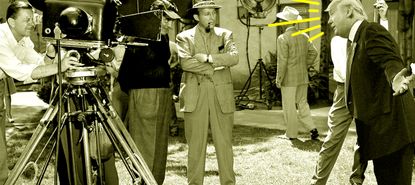What Trump learned from Hollywood about playing president
Our reality TV president appears to think he's in the movies, and he's drawing all the wrong lessons


Donald Trump is frequently referred to as America's first reality TV president, and there is some truth to that. He did revive his flagging fortunes with his successful role as a termination-happy boss on NBC's The Apprentice and offshoot The Celebrity Apprentice. But Trump appears to view his presidency in more cinematic terms.
It's a fool's game to try and get inside Trump's head, but based on his own words, spoken aloud with cameras around to capture them, Trump acts as if he sees himself as the star and director of his own feature film. And he seems to have learned all the wrong lessons from Hollywood when creating his most ambitious performance yet: President Trump.
Hollywood is a dream factory, and needless to say, an active willing suspension of disbelief has some downsides when you are leader of the free world. Here are some lessons Trump appears to have mislearned from Hollywood:
Subscribe to The Week
Escape your echo chamber. Get the facts behind the news, plus analysis from multiple perspectives.

Sign up for The Week's Free Newsletters
From our morning news briefing to a weekly Good News Newsletter, get the best of The Week delivered directly to your inbox.
From our morning news briefing to a weekly Good News Newsletter, get the best of The Week delivered directly to your inbox.
1. Appearances matter more than reality, or "Straight Out of Central Casting"
Trump acknowledges that he bases his hiring positions for some of the highest roles in government on looks. Specifically, and with an oddly un-self-conscious frequency, Trump brags about the "central casting" looks of the government employees he nominated or oversees.
You could go through each of Trump's Cabinet secretaries, and just about every one could plausibly be some casting agent's pick: Steven Mnuchin — a former Hollywood producer, perhaps coincidentally — looks like a credible treasury secretary, for example, and if you thought an education secretary is supposed to look like a stern teacher, Betsy DeVos could probably get the part. Same with human Monopoly plutocrat Wilbur Ross at the Commerce Department and TV Texas oilman Rick Perry at Energy. Trump also seemed to love the tough, steel-spined generals, though not enough to put up with their disagreements with his policies or habits.
In reality, most of Trump's original Cabinet was gone within a year or two, departed due to their swampiness, incompetence, or scruples, Trump's whims, or some combination thereof. Looks aren't everything.
2. Presidents can just order things into reality, or "Make It So"
In the movies, presidents order their lackeys and underlings to do their bidding, and their bidding gets done. In real life, if something isn't legal or practicable, their bidding sometimes gets shot down. So Trump doesn't get his citizenship question on the 2020 census, and his White House counsel and outside lackeys both refused to fire Special Counsel Robert Mueller, they testified to Mueller's prosecutors; his Bastille Day-inspired grand military parade ends up as two tanks, some flyovers, and lots of fireworks; his big campaign promise, the wall, gets stymied by Congress, the courts, and Mexico's stubborn unwillingness to pay for a massive project it does not want.
But Trump has found the areas where he cannot be checked — presidential pardons, for example, and military strikes — and like Star Trek's various USS Enterprise captains, he makes things happen. Trump pushes the envelope with novel interpretations of executive authority, too, with limited success. Also, Trump literally acts like a director at times, telling news cameras to cut and do a second take during interviews on weighty subjects.
3. Celebrity feuds are a net positive, or "All Press Is Good Press!"
You might think sniping at Rosie O'Donnell, Meryl Streep, Michael Moore, and a long string of celebrity and celebrity athletes is unbecoming in a president, but Trump appears to believe that celebrity feuds are a useful way to stay in the news, settle scores, or change the subject. That sometimes works in Hollywood, and maybe it works in the short term from the Oval Office, but polling suggests voters don't find it appealing in the longer term.
Trump's approval rating has stayed in a stubbornly narrow range around 42 percent, despite a good economy and low unemployment. And in ABC News/Washington Post polls, for example, about 70 percent of Americans say Trump acts "unpresidential" at times and fewer than 30 percent say his behavior is "fitting and proper" for a president. Focus groups of swing voters reliably rate Trump's tweeting as among his big turn-offs. Trump truly does appear to believe all publicity is good publicity — when his wife, Melania Trump, was caught plagiarizing part of a Michelle Obama speech at the Republican National Convention, for example, this was Trump's response:
Two months later, Trump's campaign almost collapsed after his Access Hollywood sexual assault confessional earned him a lot of publicity, showing that the 2016 political version of a leaked celebrity sex tape isn't a ticket to stardom. Still, Trump got enough Electoral College votes to win the election, so maybe he isn't all wrong about staying in the news.
4. All politicians are corrupt and venal, or "They Let You Do It"
The most telling line of Trump's Access Hollywood tape was his assertion: "When you're a star, they let you do it. You can do anything." This appears to fit his idea of politicians, too. And this is perhaps Trump's biggest Hollywood problem: He seems to have modeled his "President Trump" character on the TV and movie caricature of the corrupt, ethics-free politician, and, already predisposed to the role, he has taken it to heart.
Take, for example, Trump's recent interview with ABC News' George Stephanopoulos. When asked, Trump said of course he would welcome "dirt" on domestic opponents from foreign governments, because any politician would. When Stephanopoulos noted that Trump's hand-picked FBI director disagreed, this is Trump's reply:
The FBI Director is wrong. Because, frankly, it doesn't happen like that in life. Now, maybe it will start happening. Maybe today you think differently, but two or three years ago, if somebody comes into your office with oppo research — they call it oppo research — with information that might be good or bad or something, but good for you, bad for your opponent, you don't call the FBI. I would guarantee you that 90 percent, could be 100 percent of the congressmen or the senators over there, have had meetings, if they didn't they probably wouldn't be elected, on negative information about their opponent. [President Trump to ABC News]
This doesn't seem to be true. And it's a telling statement from someone who promised to "drain the swamp."
"In our time covering Congress — doing on a decade — we've never heard anyone ever even privately say they would accept foreign assistance in an election. Ever," Politico's Jake Sherman, Anna Palmer, and Daniel Lippman wrote after that interview. "And a lot of members have said crazy stuff to us privately!" Opposition research "is absolutely a part of every election," but "that dirt-digging is not conducted by foreign governments," they said. "It is conducted by political professionals who spend all day on Nexis, and digging through clips and county court filings." They asked if anyone wanted to defend Trump, and they next day, they included this follow-up note: "We did not get a single email defending the president's view that it's standard operating procedure to take opposition research from foreign governments. And, believe us, we get lots of emails."
In real life, members of Congress from both parties go to jail for corruption or breaking the law. They get expelled for ethics violations. And most of them don't enter public service for the money or fame. The majority of lawmakers want to make a difference, and few enjoy the money-hustling aspect of funding their expensive campaigns.
Still, Trump has a broad and willing audience for his version of Washington swamp creature. On TV shows — starting with children's cartoons — and in the movies, members of Congress and presidents and small-town mayors are almost always corrupt and incompetent and venal.
That makes for good TV and movies. It's terrible for public policy.
Create an account with the same email registered to your subscription to unlock access.
Sign up for Today's Best Articles in your inbox
A free daily email with the biggest news stories of the day – and the best features from TheWeek.com
Peter has worked as a news and culture writer and editor at The Week since the site's launch in 2008. He covers politics, world affairs, religion and cultural currents. His journalism career began as a copy editor at a financial newswire and has included editorial positions at The New York Times Magazine, Facts on File, and Oregon State University.
-
 'Stormy Monday for Don'
'Stormy Monday for Don'Today's Newspapers A roundup of the headlines from the US front pages
By The Week Staff Published
-
 6 queer poets to read whenever but especially now
6 queer poets to read whenever but especially nowThe Week Recommends April is National Poetry Month
By Scott Hocker, The Week US Published
-
 How women's pain is often ignored in health care
How women's pain is often ignored in health carethe explainer The gap in care is especially glaring compared to how men are treated
By Theara Coleman, The Week US Published
-
 Arizona court reinstates 1864 abortion ban
Arizona court reinstates 1864 abortion banSpeed Read The law makes all abortions illegal in the state except to save the mother's life
By Rafi Schwartz, The Week US Published
-
 Trump, billions richer, is selling Bibles
Trump, billions richer, is selling BiblesSpeed Read The former president is hawking a $60 "God Bless the USA Bible"
By Peter Weber, The Week US Published
-
 The debate about Biden's age and mental fitness
The debate about Biden's age and mental fitnessIn Depth Some critics argue Biden is too old to run again. Does the argument have merit?
By Grayson Quay Published
-
 How would a second Trump presidency affect Britain?
How would a second Trump presidency affect Britain?Today's Big Question Re-election of Republican frontrunner could threaten UK security, warns former head of secret service
By Harriet Marsden, The Week UK Published
-
 'Rwanda plan is less a deterrent and more a bluff'
'Rwanda plan is less a deterrent and more a bluff'Instant Opinion Opinion, comment and editorials of the day
By The Week UK Published
-
 Henry Kissinger dies aged 100: a complicated legacy?
Henry Kissinger dies aged 100: a complicated legacy?Talking Point Top US diplomat and Nobel Peace Prize winner remembered as both foreign policy genius and war criminal
By Harriet Marsden, The Week UK Last updated
-
 Trump’s rhetoric: a shift to 'straight-up Nazi talk'
Trump’s rhetoric: a shift to 'straight-up Nazi talk'Why everyone's talking about Would-be president's sinister language is backed by an incendiary policy agenda, say commentators
By The Week UK Published
-
 More covfefe: is the world ready for a second Donald Trump presidency?
More covfefe: is the world ready for a second Donald Trump presidency?Today's Big Question Republican's re-election would be a 'nightmare' scenario for Europe, Ukraine and the West
By Sorcha Bradley, The Week UK Published